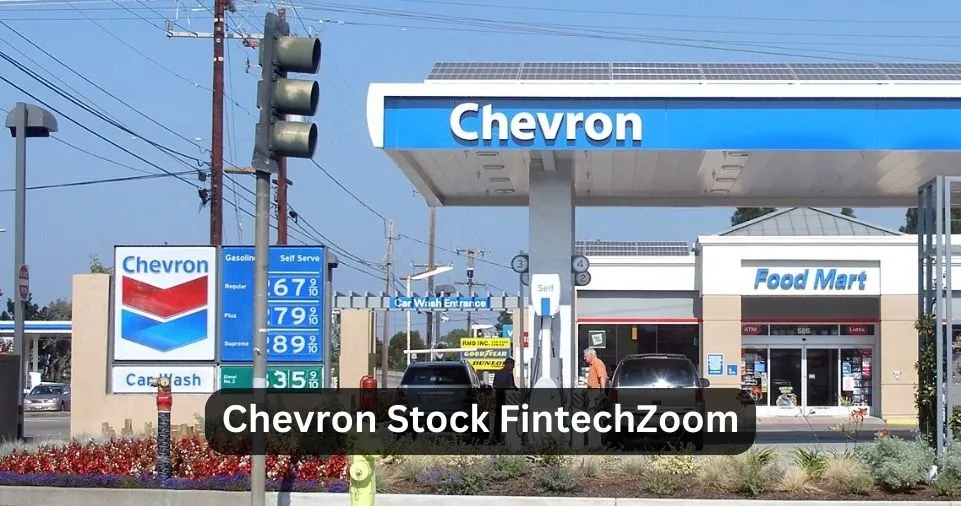Chevron Corporation, a global giant in the energy sector, is a top choice for investors looking for exposure to the oil, gas, and renewable energy markets.
With its stock listed on the New York Stock Exchange under the ticker symbol CVX, Chevron is not only a significant player in the Dow Jones Industrial Average but also a staple in many investment portfolios.
Today, at FintechZoom Blog, we will explore how FintechZoom provides robust tools and insights to analyze Chevron stock, enabling you to make well-informed investment decisions.
We’ll also cover key factors influencing Chevron’s stock performance and how you can leverage these insights for strategic investing.
Understanding Chevron Corporation

Chevron’s History and Market Standing
Chevron Corporation, established in 1879 in California, has grown into one of the world’s most diversified and influential energy companies.
From its early days as a small oil company, Chevron has expanded its operations globally, now involved in nearly every aspect of the energy industry, including exploration, production, refining, marketing, and transportation of oil, natural gas, and renewable energy.
Chevron’s operations span more than 180 countries, solidifying its role as a key player in the global energy market.
Chevron’s stock performance has historically been stable, making it a reliable choice for investors seeking both growth and income.
In 2023, the company reported a dividend yield of 3.94%, underscoring its commitment to returning value to shareholders.
Chevron’s strategic investments in renewable energy and its ability to adapt to changing market conditions further strengthen its position as a long-term investment.
The Importance of Chevron’s Role in Energy Transition
As the world shifts towards sustainable energy solutions, Chevron has taken proactive steps to align with this transition.
The company has invested in renewable energy projects and low-carbon technologies to reduce its environmental impact and stay competitive in the evolving energy landscape.
Chevron’s ability to manage this transition effectively is crucial for its continued growth and is a significant consideration for investors focused on environmental, social, and governance (ESG) factors.
Key Factors Affecting FintechZoom Chevron Stock Performance
Oil and Gas Price Volatility
Chevron’s financial health is closely tied to fluctuations in oil and gas prices. As a major producer, the company’s revenue and profitability depend on global demand and supply dynamics.
For instance, rising oil prices typically lead to increased profits for Chevron, which in turn can boost its stock price.
Conversely, when prices drop, it can negatively impact the company’s earnings and lead to a decline in stock value. Monitoring these price trends is crucial for making informed investment decisions.
Global Economic Conditions
The performance of Chevron stock is heavily influenced by the broader global economy.
Economic growth generally leads to higher energy consumption, which benefits Chevron by driving up demand for its products.
However, during economic downturns, energy demand can fall, leading to lower revenues and, consequently, a decrease in stock value.
Understanding global economic trends is essential for predicting how these fluctuations might affect Chevron’s financial performance.
Energy Transition Initiatives
Chevron’s ongoing investments in renewable energy are a response to the global shift towards cleaner energy.
These investments are not just about compliance; they are strategic moves to ensure long-term sustainability and profitability.
The success of these initiatives will play a significant role in Chevron’s future stock performance, as investors increasingly prioritize companies with strong ESG credentials.
Geopolitical Risks
Chevron operates in numerous countries, which exposes it to various geopolitical risks, including political instability, regulatory changes, and trade policies.
For example, tensions in oil-producing regions or shifts in international trade policies can impact Chevron’s operations and profitability.
Investors must consider these risks when evaluating Chevron stock, as geopolitical events can lead to significant volatility in stock prices.
Dividend Yield and Shareholder Returns
Chevron is renowned for its strong dividend yield, making it a favorite among income-focused investors.
The company’s consistent dividend payments are a testament to its financial stability and commitment to shareholder returns.
Chevron’s ability to maintain or grow its dividend payouts is a critical factor in its stock valuation, especially for investors seeking steady income.
Leveraging FintechZoom for Chevron Stock Analysis
Real-Time Data and Market Updates
FintechZoom is an invaluable resource for investors, providing real-time stock quotes, market data, and news updates for Chevron stock.
In the volatile energy market, staying updated with real-time data is crucial. This feature is especially useful during critical periods, such as earnings reports, oil price shifts, or geopolitical developments, where rapid changes can impact stock prices.
Comprehensive Financial Analysis
FintechZoom offers detailed financial metrics that allow you to assess Chevron’s overall financial health.
By examining key figures like revenue growth, earnings per share (EPS), and operating margins, you can gain a deeper understanding of the company’s performance.
For example, a strong EPS might indicate that Chevron is managing its resources efficiently, which could make the stock more attractive to potential investors.
Advanced Charting and Technical Analysis Tools
For those who rely on technical analysis, FintechZoom provides advanced charting tools that enable you to track Chevron’s stock trends over time.
These tools include customizable charts and a variety of technical indicators such as moving averages, Relative Strength Index (RSI), and MACD.
These features help you identify potential entry and exit points, making your investment strategy more data-driven and precise.
Access to Historical Data
Understanding past performance is crucial for forecasting future stock movements.
FintechZoom gives you access to extensive historical data on Chevron stock, including past price trends, earnings reports, and other performance metrics.
By analyzing this data, you can make more informed predictions about how the stock might perform under similar market conditions in the future.
Market Sentiment and Analyst Ratings
FintechZoom aggregates market sentiment and analyst ratings for Chevron stock, providing a comprehensive overview of how the market perceives the company’s future prospects.
This information can be particularly useful when deciding whether to buy, hold, or sell Chevron stock.
Positive analyst ratings, for example, could signal a potential upward trend, while negative sentiment might indicate risks to be aware of.
News Aggregation and Insights
Staying informed about the latest news and developments related to Chevron is vital for making timely investment decisions.
FintechZoom consolidates news articles, reports, and analyst commentary into one place, giving you a centralized resource for all the information you need.
Whether it’s a new regulatory policy, a significant operational update, or changes in oil prices, being in the know can help you react quickly to any market changes.
Step-by-Step Guide to Investing in Chevron Stock with FintechZoom
Review Expert Opinions
Before making any investment, it’s essential to consult expert opinions and analyses.
FintechZoom provides access to detailed reviews and insights from trusted sources, such as the International Energy Agency (IEA).
These analyses offer a deeper understanding of Chevron’s market position and can guide your investment strategy.
Evaluate Financial Metrics
To develop a sound investment strategy, you need to thoroughly evaluate Chevron’s financial metrics, including revenue, EPS, and debt ratio.
For instance, a high EPS combined with a low debt-to-equity ratio often indicates financial stability, making Chevron stock a potentially safer investment.
FintechZoom’s tools make it easy to analyze these metrics and compare them with Chevron’s competitors.
Understand the Debt Ratio
Chevron’s debt ratio is a crucial indicator of its financial health. A lower debt-to-equity ratio means the company has less reliance on borrowing, which could be a positive sign for potential investors.
Evaluating this ratio using FintechZoom’s resources helps you assess Chevron’s risk level and decide whether it aligns with your investment goals.
Compare Chevron with Competitors
To determine if Chevron is the best investment option, you should compare its performance with other major players in the energy sector. FintechZoom provides comparative tools that allow you to evaluate Chevron’s stock against its competitors, helping you make a more informed investment decision.
Utilize Technical Analysis for Strategic Entry
FintechZoom’s technical analysis tools are particularly useful for identifying optimal entry and exit points in the market.
By analyzing trends and using indicators like moving averages, you can develop a strategy that maximizes your investment returns while minimizing risks.
Challenges and Risks of Investing in Chevron Stocks
Oil Price Volatility
Oil prices are inherently volatile, and this volatility directly affects Chevron’s stock performance.
A sudden drop in oil prices due to global oversupply or reduced demand can lead to a significant decline in Chevron’s stock value.
Conversely, a surge in prices might boost the stock, but the unpredictability of these fluctuations remains a risk.
Regulatory and Geopolitical Risks
Chevron’s operations across multiple countries expose it to various regulatory and geopolitical risks.
Changes in environmental regulations or geopolitical tensions in oil-producing regions can impact the company’s operations and profitability.
These risks must be considered when evaluating the potential returns of investing in Chevron stock.
Technological Innovations
Technological advancements in the energy sector, particularly in renewable energy, pose both opportunities and risks for Chevron.
While the company has invested in low-carbon technologies, the pace of innovation could either bolster Chevron’s market position or render some of its assets less valuable.
Economic Fluctuations
Global economic conditions, such as recessions or inflation, can lead to reduced energy consumption, negatively impacting Chevron’s revenue and stock price.
Investors need to stay informed about global economic trends and their potential effects on energy demand.
Reputation and Public Perception
Chevron’s reputation can significantly influence its stock performance.
Environmental incidents, negative public perception, or damaging reports can lead to investor skepticism and a drop in stock price.
It’s important to monitor these factors as they can have an immediate impact on market sentiment.
ALSO READ
Conclusion: Strategic Investing with FintechZoom Chevron Stock
Investing in Chevron stock offers potential for significant returns, but it requires careful analysis and strategic decision-making.
FintechZoom provides the tools and insights necessary to navigate the complexities of the energy market, enabling you to make informed decisions.
By leveraging real-time data, comprehensive financial analysis, advanced charting tools, and expert insights, you can enhance your investment strategy and manage risks effectively.
As the energy market continues to evolve, staying informed and using the right tools is key to successful investing.
With FintechZoom’s platform, you’re well-equipped to capitalize on opportunities and make strategic investments in Chevron stock.
FAQs
How can FintechZoom assist in investing in Chevron?
FintechZoom offers real-time data, comprehensive financial analysis, and advanced technical tools that help you make informed investment decisions in Chevron stock.
Is Chevron a globally recognized company?
Yes, Chevron is a leading multinational energy corporation with a significant presence in the global market.
Does Chevron offer good dividend returns?
Chevron is known for its strong dividend yields, making it an attractive option for income-focused investors.
How does Chevron address the risks associated with the energy market?
Chevron invests in low-carbon technologies and renewable energy projects to mitigate risks and align with the global shift towards sustainable energy.
Is Chevron a good long-term investment?
Chevron’s investments in energy sustainability and its strong market position make it a solid option for long-term investment.

